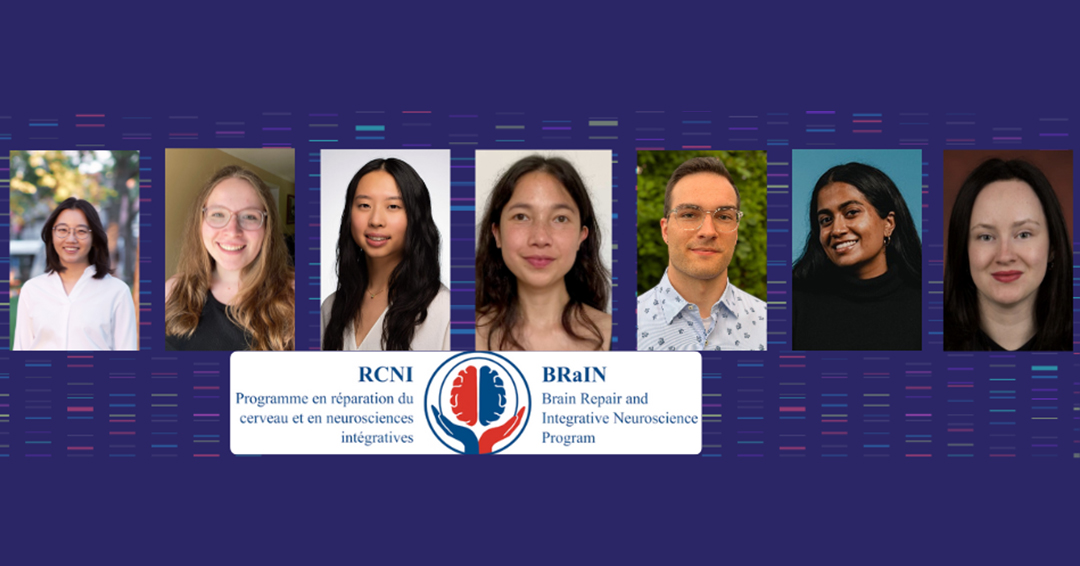
BRaIN Program trainees recognized for outstanding research excellence and competitive fellowships.
The Research Institute of the McGill University Health Centre (The Institute) is proud to recognize the outstanding achievements of several trainees from the Brain Repair and Integrative Neuroscience (BRaIN) Program. These emerging researchers have recently received prestigious awards and fellowships in support of their innovative work, highlighting both their individual excellence and the strength of the BRaIN training environment.
“These recent awards are a testament to the exceptional calibre of trainees within the BRaIN Program,” says Jesper Sjöström, PhD, Interim BRaIN Program Leader. “Their success reflects not only their individual talent and dedication but also the strength of our collaborative, interdisciplinary research environment.”
The following trainees exemplify the diversity and impact of research underway across the program’s many labs:
Julie O’Reilly, a Ph.D. candidate in the lab of Charles Bourque, PhD, earned a Doctoral Training Scholarship from the Fonds de recherche du Québec – Santé (FRQS). This competitive award supports her investigation into how traumatic brain injury (TBI) affects the body’s fluid balance systems. Julie’s research focuses on the neural mechanisms underlying fluid homeostasis following TBI—an area with significant clinical relevance for improving patient outcomes.
Shawniya Alageswaran, a trainee in Jesper Sjöström’s lab, secured a Doctoral Scholarship from the Fonds de recherche du Québec – Nature et technologies (FRQNT). Her research explores nervous system plasticity using a unique combination of electrical and light-based stimulation techniques. The award will support her ongoing work, helping her delve deeper into mechanisms of synaptic function and adaptability.
Meghan Appleby, also in Jesper Sjöström’s lab, was awarded a Canadian Institutes of Health Research (CIHR) CGS-M award for her project “Neocortical Microcircuit Changes Associated with Fragile X Syndrome.” Using optogenetics and electrophysiology, Meghan is investigating how neural microcircuits are altered in a mouse model of this major genetic cause of intellectual disability and autism spectrum disorder.
Airi Watanabe received the Salvatore Carbonetto Award, which recognizes outstanding performance by a graduate student at the Centre for Research in Neuroscience (CRN). Part of Jesper Sjöström’s lab, her Ph.D. research focuses on astrocytes—glial cells that play a critical role in synaptic plasticity. Her work is uncovering how these cells interact with neurons to shape the strengthening or weakening of synaptic connections during learning.
Elia Painchaud-Lakatos, another member of Jesper Sjöström’s lab, was recognized with both an NSERC CGS-M and a FRQS Bourse de maîtrise en recherche for her project, “Miswiring of Visual Cortex Microcircuits in Dark-Reared Mice.” Using an advanced technique called optomapping, Elia is investigating how the absence of visual input during early development impacts brain wiring—a study that could inform future strategies for vision restoration.
Christina Chou garnered a CIHR-INMHA Brain Star Award—an award recognizing high-impact research by trainees in neuroscience, mental health, and addiction—for developing optomapping, a fast, high-precision technique to study synaptic connections in the brain. Working in Jesper Sjöström’s lab, her research revealed new principles of how neurons connect in the visual cortex. Christina led this work as part of her PhD at McGill and is now a medical writer at liV Medical Education Agency.
Max Kowalczyk secured a Doctoral Research Scholarship from the FRQS to support his research. As part of the lab of Wei-Hsiang Huang, PhD, his project investigates how the TSC2-mTORC1 pathway regulates the development and function of specific neuronal populations in the brain.
We extend our sincere congratulations to all of these outstanding trainees for their recent successes. Their dedication and achievements continue to advance the mission of the BRaIN Program and underscore the vibrant training culture at The Institute.
